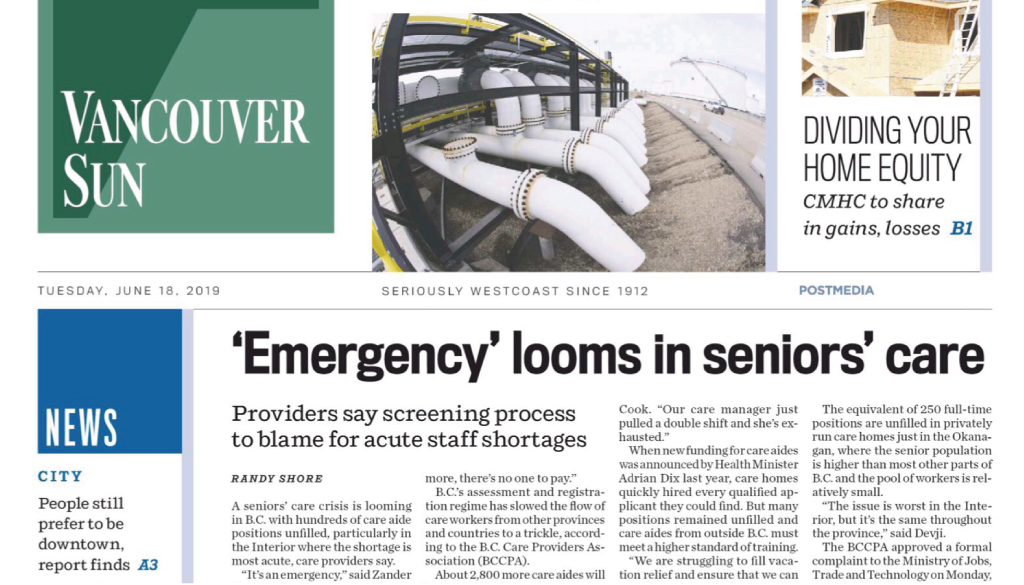Earlier this week, BC Care Providers Association (BCCPA) issued a news release exposing the unfair labour practices that the Province of British Columbia is imposing on health care assistants from other provinces, such as Alberta.
BCCPA has highlighted the fact that Canadian-trained HCAs are currently required by the BC Care Aide and Community Health Worker Registry to have their credentials assessed before they are eligible to begin working for one of B.C.’s publicly subsidized health care providers.
This credential assessment exam—known as the Nursing Community Assessment Services (NCAS)—costs $800 and has a very low success rate. Currently, only 1% of applicants are permitted to immediately begin employment after completing the assessment, with the other 99% of applicants are required to complete additional courses and training.
Outcomes for care aides from the NCAS exam are diverse, and include:
- Direct Registration (1%): care aides are permitted to immediately begin employment in the health care sector.
- Targeted Modules (34%): care aides are required to complete short online modules on topics such as infection control, client mobility, and violence prevention. Care aides typically complete targeted modules within four to twelve weeks, at a cost of $150 to $600.
- Individual Courses (16%): care aides are required to complete individual HCA courses. Topics may include caring for people with cognitive health challenges, or personal care and assistance. Care aides typically complete courses in 7-18 weeks, with costs ranging from $350 to $1,200 depending on whether lab time is required.
- HCA Upgrade Program (38%): care aides are required to complete a twelve-week HCA refresher program, which may be offered through a combination of online and in-person delivery. The program currently costs up to $4,500, and the typical completion time, from referral to registration, is 8 months.
- HCA Program, Full or Access (11%): care aides are required to complete a comprehensive training program, ranging from 18 to 26 weeks in length. Costs vary by post-secondary institution from $3,500 to $11,000. Typical completion time, from referral to registration is 11 months.
The B.C. Ministry of Health reports that since the provincial assessment process was implemented in January 2018, only 23% of Canadian applicants and 54% of international applicants have successfully completed the registration process.[i] Applicants have identified that costs, time commitment and travel requirements are major barriers to completing registration.
With most workers facing significant barriers, BCCPA is calling upon the provincial government and BC Care Aide and Community Health Worker Registry to find solutions that will both maintain B.C.’s high educational standards, while also meeting the staffing needs of care providers. Given the critical workforce shortages currently being experience in B.C.’s interior, it is clear that immediate action is required to ensure that frail and elderly seniors receive the care that they need.
[i] British Columbia, Debates of the Legislative Assembly, Hansard, 40th Parl, 4th Sess, (14 May 2019) at 1110 (Hon. A Dix).
Media
View media coverage of BCCPA’s complaint over unfair labour practices imposed by the B.C. Government on out-of-province HCAs.
B.C. Care Providers Associations files complaint over out-of-province work ‘restrictions’ – Global News
Seniors’ care emergency looms in B.C. due to staff shortages – Vancouver Sun
Care aides file complaint – Okanagan Edge/Castanet
Restrictive policies affecting labour mobility for care aides in B.C. – Black Press





